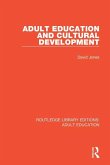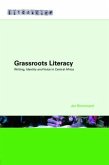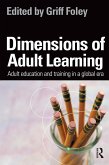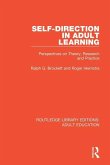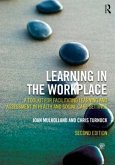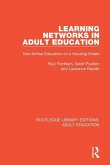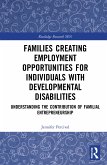Development and Assessment of Self-Authorship
Exploring the Concept Across Cultures
Herausgeber: Magolda, Marcia B. Baxter; Creamer, Elizabeth G.; Meszaros, Peggy S.
Development and Assessment of Self-Authorship
Exploring the Concept Across Cultures
Herausgeber: Magolda, Marcia B. Baxter; Creamer, Elizabeth G.; Meszaros, Peggy S.
- Broschiertes Buch
- Merkliste
- Auf die Merkliste
- Bewerten Bewerten
- Teilen
- Produkt teilen
- Produkterinnerung
- Produkterinnerung
This book brings together new scholarship that expands and refines the concept of self-authorship across cultures. It adopts a constructive-developmental approach to self-evolution that emphasizes the interaction of personal characteristics and contextual influences on individuals' construction of knowledge, identities, and relationships.
Andere Kunden interessierten sich auch für
![Adult Education and Cultural Development Adult Education and Cultural Development]() David JonesAdult Education and Cultural Development45,99 €
David JonesAdult Education and Cultural Development45,99 €![Grassroots Literacy Grassroots Literacy]() Jan BlommaertGrassroots Literacy66,99 €
Jan BlommaertGrassroots Literacy66,99 €![Dimensions of Adult Learning Dimensions of Adult Learning]() Dimensions of Adult Learning42,99 €
Dimensions of Adult Learning42,99 €![Self-direction in Adult Learning Self-direction in Adult Learning]() Ralph G. BrockettSelf-direction in Adult Learning45,99 €
Ralph G. BrockettSelf-direction in Adult Learning45,99 €![Learning in the Workplace Learning in the Workplace]() Joan MulhollandLearning in the Workplace53,99 €
Joan MulhollandLearning in the Workplace53,99 €![Learning Networks in Adult Education Learning Networks in Adult Education]() Paul FordhamLearning Networks in Adult Education45,99 €
Paul FordhamLearning Networks in Adult Education45,99 €![Families Creating Employment Opportunities for Individuals with Developmental Disabilities Families Creating Employment Opportunities for Individuals with Developmental Disabilities]() Jennifer PercivalFamilies Creating Employment Opportunities for Individuals with Developmental Disabilities50,99 €
Jennifer PercivalFamilies Creating Employment Opportunities for Individuals with Developmental Disabilities50,99 €-
-
-
This book brings together new scholarship that expands and refines the concept of self-authorship across cultures. It adopts a constructive-developmental approach to self-evolution that emphasizes the interaction of personal characteristics and contextual influences on individuals' construction of knowledge, identities, and relationships.
Produktdetails
- Produktdetails
- Verlag: Routledge
- Seitenzahl: 314
- Erscheinungstermin: 9. März 2010
- Englisch
- Abmessung: 229mm x 152mm x 17mm
- Gewicht: 457g
- ISBN-13: 9781579223687
- ISBN-10: 1579223680
- Artikelnr.: 26851986
- Herstellerkennzeichnung
- Libri GmbH
- Europaallee 1
- 36244 Bad Hersfeld
- gpsr@libri.de
- Verlag: Routledge
- Seitenzahl: 314
- Erscheinungstermin: 9. März 2010
- Englisch
- Abmessung: 229mm x 152mm x 17mm
- Gewicht: 457g
- ISBN-13: 9781579223687
- ISBN-10: 1579223680
- Artikelnr.: 26851986
- Herstellerkennzeichnung
- Libri GmbH
- Europaallee 1
- 36244 Bad Hersfeld
- gpsr@libri.de
Marcia B. Baxter Magolda is Distinguished Professor Emerita, Miami University of Ohio and a nationally recognized author and speaker on student development and learning. She received the American College Personnel Association's Lifetime Achievement Award in 2014, and the Association for the Study of Higher Education's Research Achievement Award in 2007, for her outstanding contribution to advancing student learning. Her scholarship addresses the evolution of learning and development in college and subsequent adult life, and educational practice to promote self-authorship. Her seventh and eighth books respectively are Authoring Your Life and Development and Assessment of Self-Authorship. Peggy S. Meszaros Elizabeth G. Creamer
List of Figures & Tables Acknowledgements Part One. The Nature of
Self-Authorship 1. Foundational Assumptions and Constructive-Developmental
Theory. Self-Authorship Narratives. Lisa M. Boes, Marcia B. Baxter Magolda,
and Jennifer A. Buckley 2. The Interweaving of Epistemological,
Intrapersonal, and Interpersonal Development in the Evolution of
Self-Authorship. Marcia B. Baxter Magolda 3. Linking Learning Conceptions
to Self-Authorship and Beyond- Rebecca Hamer and Erik Jan van Rossum Part
Two. Multicultural Perspectives on Self-Authorship 4. Investigating Latino
Ethnic Identity within the Self-Authorship Framework. Vasti Torres 5. An
Exploratory Study of the Relationship between Adolescent Risk and
Resilience and the Early Development of Self-Authorship. Peggy S. Meszaros
and Crystal Duncan Lane 6. Towards Self-Authorship in Child Care Students.
Implications for Working with Children and their Families -Joanne Brownlee,
Donna Berthelsen, and Gillian Boulton-Lewis 7. Epistemological Development
of Bedouins and Jews in Israel. Implications for Self-Authorship. Michael
Weinstock 8. Personal Epistemology, Learning, and Cultural Context. Japan
and the U. S. -Barbara K. Hofer Part Three. Theoretical and Methodological
Challenges in Understanding and Assessing Self-Authorship 9. Beyond
Self-Authorship. Fifth Order and the Capacity for Social Consciousness.
Kelli Zaytoun 10. The Role of the Cognitive Dimension of Self-Authorship.
An Equal Partner or the Strong Partner?. Patricia M. King 11. What is
Self-Authorship?. A Theoretical Exploration of the Construct. Jane
Elizabeth Pizzolato 12. Demonstrating the Link Between Reasoning and Action
in the Early Stages of Self-Authorship. Elizabeth G. Creamer 13. Getting to
the Complexities of Identity. The Contributions of an Autoethnographic and
Intersectional Approach. Susan R. Jones 14. Using the Subject-Object
Interview to Promote and Assess Self-Authorship. Jennifer Garvey Berger
Part Four. Future Directions 15. Future Directions. Pursuing Theoretical
and Methodological Issues in the Evolution of Self-Authorship. Marcia B.
Baxter Magolda Index
Self-Authorship 1. Foundational Assumptions and Constructive-Developmental
Theory. Self-Authorship Narratives. Lisa M. Boes, Marcia B. Baxter Magolda,
and Jennifer A. Buckley 2. The Interweaving of Epistemological,
Intrapersonal, and Interpersonal Development in the Evolution of
Self-Authorship. Marcia B. Baxter Magolda 3. Linking Learning Conceptions
to Self-Authorship and Beyond- Rebecca Hamer and Erik Jan van Rossum Part
Two. Multicultural Perspectives on Self-Authorship 4. Investigating Latino
Ethnic Identity within the Self-Authorship Framework. Vasti Torres 5. An
Exploratory Study of the Relationship between Adolescent Risk and
Resilience and the Early Development of Self-Authorship. Peggy S. Meszaros
and Crystal Duncan Lane 6. Towards Self-Authorship in Child Care Students.
Implications for Working with Children and their Families -Joanne Brownlee,
Donna Berthelsen, and Gillian Boulton-Lewis 7. Epistemological Development
of Bedouins and Jews in Israel. Implications for Self-Authorship. Michael
Weinstock 8. Personal Epistemology, Learning, and Cultural Context. Japan
and the U. S. -Barbara K. Hofer Part Three. Theoretical and Methodological
Challenges in Understanding and Assessing Self-Authorship 9. Beyond
Self-Authorship. Fifth Order and the Capacity for Social Consciousness.
Kelli Zaytoun 10. The Role of the Cognitive Dimension of Self-Authorship.
An Equal Partner or the Strong Partner?. Patricia M. King 11. What is
Self-Authorship?. A Theoretical Exploration of the Construct. Jane
Elizabeth Pizzolato 12. Demonstrating the Link Between Reasoning and Action
in the Early Stages of Self-Authorship. Elizabeth G. Creamer 13. Getting to
the Complexities of Identity. The Contributions of an Autoethnographic and
Intersectional Approach. Susan R. Jones 14. Using the Subject-Object
Interview to Promote and Assess Self-Authorship. Jennifer Garvey Berger
Part Four. Future Directions 15. Future Directions. Pursuing Theoretical
and Methodological Issues in the Evolution of Self-Authorship. Marcia B.
Baxter Magolda Index
List of Figures & Tables Acknowledgements Part One. The Nature of
Self-Authorship 1. Foundational Assumptions and Constructive-Developmental
Theory. Self-Authorship Narratives. Lisa M. Boes, Marcia B. Baxter Magolda,
and Jennifer A. Buckley 2. The Interweaving of Epistemological,
Intrapersonal, and Interpersonal Development in the Evolution of
Self-Authorship. Marcia B. Baxter Magolda 3. Linking Learning Conceptions
to Self-Authorship and Beyond- Rebecca Hamer and Erik Jan van Rossum Part
Two. Multicultural Perspectives on Self-Authorship 4. Investigating Latino
Ethnic Identity within the Self-Authorship Framework. Vasti Torres 5. An
Exploratory Study of the Relationship between Adolescent Risk and
Resilience and the Early Development of Self-Authorship. Peggy S. Meszaros
and Crystal Duncan Lane 6. Towards Self-Authorship in Child Care Students.
Implications for Working with Children and their Families -Joanne Brownlee,
Donna Berthelsen, and Gillian Boulton-Lewis 7. Epistemological Development
of Bedouins and Jews in Israel. Implications for Self-Authorship. Michael
Weinstock 8. Personal Epistemology, Learning, and Cultural Context. Japan
and the U. S. -Barbara K. Hofer Part Three. Theoretical and Methodological
Challenges in Understanding and Assessing Self-Authorship 9. Beyond
Self-Authorship. Fifth Order and the Capacity for Social Consciousness.
Kelli Zaytoun 10. The Role of the Cognitive Dimension of Self-Authorship.
An Equal Partner or the Strong Partner?. Patricia M. King 11. What is
Self-Authorship?. A Theoretical Exploration of the Construct. Jane
Elizabeth Pizzolato 12. Demonstrating the Link Between Reasoning and Action
in the Early Stages of Self-Authorship. Elizabeth G. Creamer 13. Getting to
the Complexities of Identity. The Contributions of an Autoethnographic and
Intersectional Approach. Susan R. Jones 14. Using the Subject-Object
Interview to Promote and Assess Self-Authorship. Jennifer Garvey Berger
Part Four. Future Directions 15. Future Directions. Pursuing Theoretical
and Methodological Issues in the Evolution of Self-Authorship. Marcia B.
Baxter Magolda Index
Self-Authorship 1. Foundational Assumptions and Constructive-Developmental
Theory. Self-Authorship Narratives. Lisa M. Boes, Marcia B. Baxter Magolda,
and Jennifer A. Buckley 2. The Interweaving of Epistemological,
Intrapersonal, and Interpersonal Development in the Evolution of
Self-Authorship. Marcia B. Baxter Magolda 3. Linking Learning Conceptions
to Self-Authorship and Beyond- Rebecca Hamer and Erik Jan van Rossum Part
Two. Multicultural Perspectives on Self-Authorship 4. Investigating Latino
Ethnic Identity within the Self-Authorship Framework. Vasti Torres 5. An
Exploratory Study of the Relationship between Adolescent Risk and
Resilience and the Early Development of Self-Authorship. Peggy S. Meszaros
and Crystal Duncan Lane 6. Towards Self-Authorship in Child Care Students.
Implications for Working with Children and their Families -Joanne Brownlee,
Donna Berthelsen, and Gillian Boulton-Lewis 7. Epistemological Development
of Bedouins and Jews in Israel. Implications for Self-Authorship. Michael
Weinstock 8. Personal Epistemology, Learning, and Cultural Context. Japan
and the U. S. -Barbara K. Hofer Part Three. Theoretical and Methodological
Challenges in Understanding and Assessing Self-Authorship 9. Beyond
Self-Authorship. Fifth Order and the Capacity for Social Consciousness.
Kelli Zaytoun 10. The Role of the Cognitive Dimension of Self-Authorship.
An Equal Partner or the Strong Partner?. Patricia M. King 11. What is
Self-Authorship?. A Theoretical Exploration of the Construct. Jane
Elizabeth Pizzolato 12. Demonstrating the Link Between Reasoning and Action
in the Early Stages of Self-Authorship. Elizabeth G. Creamer 13. Getting to
the Complexities of Identity. The Contributions of an Autoethnographic and
Intersectional Approach. Susan R. Jones 14. Using the Subject-Object
Interview to Promote and Assess Self-Authorship. Jennifer Garvey Berger
Part Four. Future Directions 15. Future Directions. Pursuing Theoretical
and Methodological Issues in the Evolution of Self-Authorship. Marcia B.
Baxter Magolda Index



